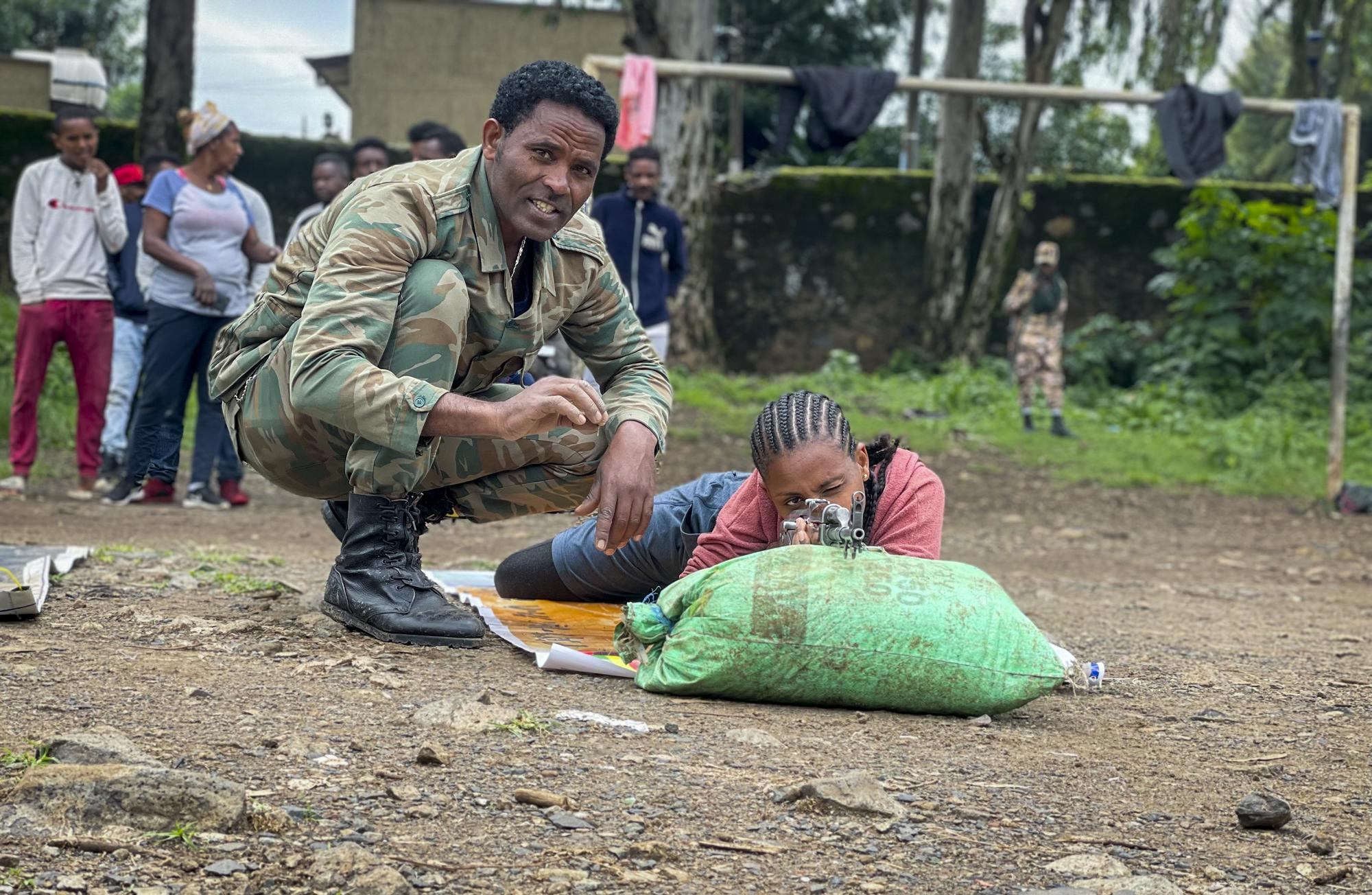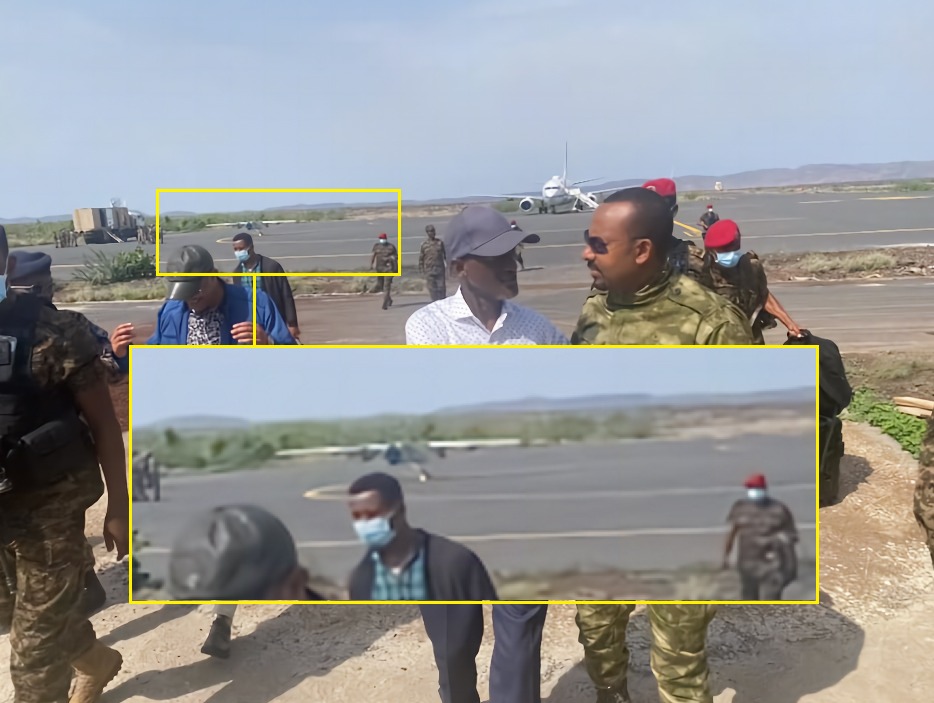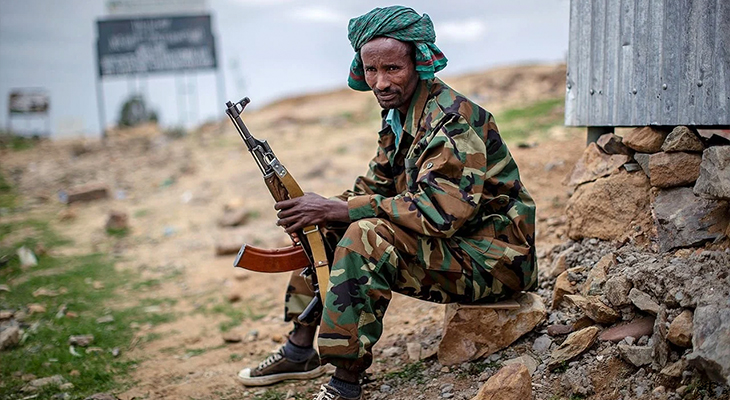The conflict in Ethiopia continues despite international appeals to put an end to it. The government forces were able to slow down the progress of the forces of the Tigray People's Liberation Front over the last two weeks, and to control some areas. However, the main areas of Afar and Amhara remained under the control of the Tigrayan rebels, who managed to form a broader alliance with other rebel groups.
Ethiopia is still witnessing intense military confrontations and severe humanitarian crises. Over 5.2 million people are in dire need of food aid in Tigray, in addition to the displacement of several ethnicities, including the displacement of about 3,000 members of the Ethiopian "Kamant" tribe to Sudan after their refusal to fight the Tigray Front, in order to avoid the targeting of Ethiopian army soldiers. Despite the military and humanitarian developments in the region, easing of the crisis does not seem to be in sight, at least in the short term.
Indicators of Conflict Escalation
The hostilities in Ethiopia continue unceasingly despite the high humanitarian cost, evidently as follows:
1- Abiy Ahmed’s announcement of mobilizing citizens for combat:
The federal government and the allied regional leaders have intensified their attempts to mobilize citizens from all over the country to join the combat against forces from the Northernmost region of Tigray since late July.
On August 10, the Ethiopian Prime Minister's office issued a statement calling on all "capable Ethiopians" to join the army, special forces and militias. This statement comes after Ethiopia's Foreign Ministry warned on August 6 that it may deploy its "full defensive capabilities" against the Tigray People's Liberation Front.
2- Addis Ababa mobilizing financial resources:
Ethiopian banks play a key role in financing the war against the Tigrayan rebels. The amount of funding raised during August is estimated to be over $8.8 Million. The Ethiopian Bankers Association (EBA) indicated the participation of 18 banks in supporting the Ethiopian army.
Notably, the economic situation has deteriorated to the extent that the Ethiopian government has asked civil servants to contribute with a one-month's salary to the Ethiopian Federal Forces, through a gradual deduction of the funds over 12 months.
Ethiopia also recently closed about 30 of its 60 embassies abroad, while diplomats and staff members of Ethiopia's embassies in a number of countries, most notably Egypt, Ghana, Rwanda, Congo, South Korea and Qatar, will also be reduced for cutting costs.


3- Ethiopia’s acquisition of drones from Iran:
On August 3, Ethiopian social media sites affiliated with the government published pictures of Prime Minister Abiy Ahmed at the airport of Simara, the capital of the Afar region, showing two drones and a ground control station.
Specialized military analysis suggested that these two planes were Iranian Mohajer-6 Drones, capable of carrying small-sized guided missiles. This reveals the inclination of the Ethiopian government to employ this new weapon to stop the advance of the Tigray Liberation Front. This may also be one of the reasons that contributed to the recent halt in the progress of the Tigray Front and its allies.
4- The return of the Eritrean forces to the conflict:
An EU memo indicated that Eritrea once again sent reinforcements to the disputed Western part of Tigray. These reinforcements came after the Ethiopian Prime Minister's unannounced visit to the Eritrean capital, Asmara, on August 17.
This step is an escalation of the conflict. The Eritrean forces withdrew last June owing to US pressure, and after sharp criticism of the Eritrean army was levelled for its involvement in serious violations of human rights by committing acts of looting, massacres and sexual assaults.
5- Other fronts joining the fight against the government:
In early August, Kumsa Diriba, current Commander of Oromo Liberation Army, announced his alliance with the Tigrayans, stressing that "the only solution now is overthrowing this government militarily". He also referred to his military and political cooperation with the Tigrayans, as he confirmed the existence of an exchange of information relevant to the battlefield and coordination of military operations, in addition to the talks regarding establishing a political alliance.
Deriba also indicated that there are discussions with other groups within Ethiopia to form a major alliance against Abiy Ahmed's regime. This was confirmed with the announcement of the Southern Sidama Front, on August 25, that it had joined the alliance of the Tigray and Oromo forces, against the Ethiopian government.
Conversely, the Ethiopian government responded to these moves by declaring both the Tigray People's Liberation Front and the Oromo Liberation Army as terrorist organizations. The accession of these fronts to the fight reveals that the Tigray Liberation Front has managed to establish a broad alliance that may pose a threat to Abiy Ahmed's government, or herald the collapse of the country by a civil war.
6- The continuous advancement of the armed opposition:
The forces of the Tigray Liberation Front took control of the city of Qashina on August 25, which is 800 km from Addis Ababa. Meanwhile, the Oromo Liberation Front was able to control the city of Ngeli on August 24, which entailed the escape of several officials of the Ethiopian government, as well as the Tigray Liberation Front seizing control of the city.
7- Accusing Sudan of being involved in supporting the Tigrayans:
Colonel Seif Engi, the Ethiopian military coordinator of operations in the Metkel area in the Benishangul-Gumuz region, announced that the Ethiopian forces thwarted the attempt of an armed group affiliated with the Tigray Front to disrupt the dam. He also referred to the Sudanese armed forces' support for this armed group, which Khartoum denied. These statements may be an attempt by Addis Ababa to mobilize the Ethiopians to fight against the Tigray rebels, and to place their image in a negative light before the Ethiopian people.
Variant International Stances
There were variant positions adopted by major and regional countries concerned with the developments of the Ethiopian crisis, which can be detailed as follows:
1- US pressure to end the combat:
The US has threatened to stop the import of Ethiopian goods in light of the continuing Tigray crisis. The US Trade Representative, Katherine Chi Tai, explained, during a virtual meeting with Chief Trade Negotiator Mihretu, that under the African Growth and Opportunity Act (AGOA), if this situation persists, human rights violations in Tigray may adversely impact Ethiopia's future eligibility to benefit from this law.
It is worth noting that there are 38 African countries eligible for duty-free access to the US market in 2020. Ethiopia exported $239 M worth of goods to the US in 2019. By the end of June 2021, Ethiopia had exported goods worth $128.7 M, including leather products and clothing.
On the other hand, on August 23, the US Department of the Treasury’s Office of Foreign Assets Control (OFAC) sanctioned General Filipos Woldeyohannes, the Chief of Staff of the Eritrean Defense Forces (EDF), for being a leader or official of an entity that is engaged in serious human rights abuse committed during the ongoing conflict in Tigray, as part of the US administration’s endeavors to pressure Eritrea to halt its intervention in the Ethiopian conflict.

![]()
2- France suspending military cooperation:
The French government decided to reduce its military cooperation with the Ethiopian government due to the conflict in the Tigray. Notably, this will not impact Ethiopia much, as the defense agreement concluded between the two countries in 2019 was a framework agreement that aims for Paris to support Ethiopia to establish an Ethiopian navy, despite Ethiopia lacking access to the sea.
3- The African bloc in the Security Council:
The group of African countries represented in the Security Council, namely Tunisia, Kenya and Niger, as well as Saint Vincent and the Grenadines, issued a statement calling on the Ethiopian government to declare its readiness for a cessation of hostilities and a ceasefire in Tigray.
In a joint statement, the group called on the Ethiopian government to negotiate with the armed opposition forces, withdraw their designation as terrorist organizations, and to halt the government's efforts of urging all citizens to take up arms and participate in the war against Tigray.
4- Chinese-Russian support for Addis Ababa:
China opposed external interference in Ethiopia's affairs, in reference to US pressure on Addis Ababa to end hostilities and its warning to China and Russia that imposing US sanctions would exacerbate the conflict.
The two countries had previously opposed issuing a statement last March calling for an end to violence in the Ethiopian region of Tigray, in addition to thwarting a draft resolution of the Council condemning Ethiopia, as the two countries considered the issue to be an internal matter for Ethiopia.
5- A vague Turkish support:
Ethiopian Prime Minister Abiy Ahmed paid an official visit to Turkey on August 18, to meet with Turkish President Recep Tayyip Erdoğan, during which a number of agreements were signed in the fields of defense and water development. After his return, Abiy Ahmed also made it clear that Ethiopia will never forget the cooperation that the Turkish government and people provided to Ethiopia during this critical period, without revealing the type or size of this support, and whether this was linked to the conflict in Ethiopia today.
In conclusion, the policies of the Ethiopian government and its militarization of the conflict have led to the expansion of the armed opposition against it, which is evident in the joining of the rebels from Amhara and Afar to the Tigray rebels. Addis Ababa seems to be still counting on military resolution, the employment of Iranian drones, as well as Eritrean military support, in resolving the conflict without making any concessions. However, its failure to end the combat, and the continuation of the conflict may lead to the economic drain of the Ethiopian government, and the possibility of the country collapsing into a state of a major civil war.


